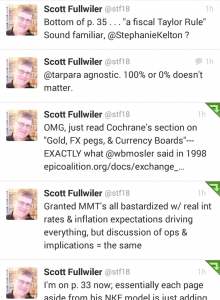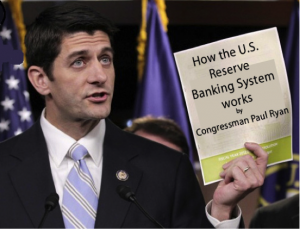*I’ll return to my series on the role of taxes in MMT later this week. Meanwhile, here’s a short post on MMT.
Modern Money Theory (MMT) seems to confuse two groups of otherwise sympathetic economists. First there are those like Paul Krugman who are generally of the Keynesian persuasion and who like MMT’s “deficit owl” approach. I think Krugman would really like to stop worrying about the deficit so that he could advocate an “as much as it takes” approach to government spending. The problem is that he just cannot quite get a handle on the monetary operations that are required. Won’t government run out? What, is government going to create money “out of thin air”? Where will all the money come from?
He really doesn’t understand that “money” is key stroke records of debits and credits. He still thinks banks take in deposits and then lend them out. He starts to tear his hair out whenever someone tries to correct him on this. He’s wedded to the deposit multiplier idea he got from his Econ 101 textbook.
Continue reading



 I’d like to propose an Essay Contest that might inform us better than any news talk show or presidential debate what we’re up against with our National Budget—and what might be the best course of action we should consider. Everyone in Congress should be required to participate, governors and state legislators who might become future congressional leaders should be encouraged to join in, and op-ed economic analysts invited to submit. The essays would be posted on a Congressional website established specifically to enable the public to vote on the best explanation of the topic. The topic I propose is this:
I’d like to propose an Essay Contest that might inform us better than any news talk show or presidential debate what we’re up against with our National Budget—and what might be the best course of action we should consider. Everyone in Congress should be required to participate, governors and state legislators who might become future congressional leaders should be encouraged to join in, and op-ed economic analysts invited to submit. The essays would be posted on a Congressional website established specifically to enable the public to vote on the best explanation of the topic. The topic I propose is this:








